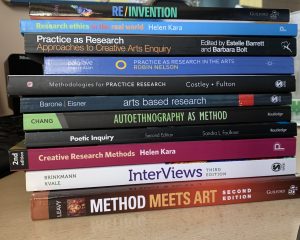
Source: NBrown
“Could you share a reading list?”
“Where is your reading list?”
“Do you have a reading list?”
In my workshops, at conferences or in teaching sessions, attendees often ask me for reading lists and resources to be able to follow up on what I talk about. And while I love being able to help, I find reading lists notoriously difficult because all publications have their strengths and limitations, and what may be good for me for one research or article is not necessarily good for me for another, let alone it being good for someone else’s purposes and needs. Also, each one of us has different reading habits. Some people prefer concise articles that can be read through quickly as a starting point and that will offer references that we can follow up if we want to. Other people favour comprehensive handbooks including different authorial voices and perspectives. And there are still other people who want to get to grips with specific aspects presented in one book written by one author. So again, what’s good for me doesn’t necessarily mean it’s good for others. A meaningful reading list therefore would need to be an annotated bibliography outlining why, when and what for a particular publication should be consulted. Having said that, I do have some publications, which I return to time and again because they are just so helpful for different reasons and different purposes.
Journals:
International Journal of Qualitative Studies in Education
International Journal of Social Research Methodology
Journal of Participatory Research Methods
Qualitative Health Research
Qualitative Inquiry
Qualitative Research
The Qualitative Report
Books:
For an introduction to creative methods and arts-based approaches:
Leavy: Method Meets Art
Kara: Creative Research Methods
Barone and Eisner: Arts-Based Research
For philosophical foundations and positionality in research:
Brinkmann and Kvale: InterViews
To understand the relationship between autos, ethnos and graphos in autoethnography:
Chang: Autoethnography as Method
For an introduction to practice as research, where practice and research interconnect and overlap:
Costley and Fulton: Methodologies for Practice Research
Nelson: Practice as Research in the Arts
Barrett and Bolt: Practice as Research: Approaches to Creative Arts Enquiry
To find out more about what it means to be ethical in research:
Kara: Research Ethics in the Real World
To explore creative writing within research practice:
Leavy: Re/Invention
Faulkner: Poetic Inquiry
Articles:
If journals and books are difficult to recommend, articles are almost impossible because of the time of publishing at play. Literature reviews should obviously be up-to-date, and as time moves on swiftly, articles that were “most recent” in 2010 are suddenly more than a decade old! However, as I like going back to the basics, I often do link back to older articles in conjunction with newer materials. And these are my “longevity” articles:
An introduction to thematic analysis:
Braun, V. & Clarke, V. (2006). Using thematic analysis in psychology. Qualitative Research in Psychology, 3:2, 77-101.
Braun, V. & Clarke, V. (2019). Reflecting on reflexive thematic analysis. Qualitative Research in Sport, Exercise and Health, 1-9.
The role of the author and researcher in the research:
Charmaz, K., & Mitchell, R. G. (1997). The myth of silent authorship: Self, substance and style in ethnographic writing. In R. Hertz (Ed.), Reflexivity & Voice (pp. 193–215). Thousand Oaks Calif.: SAGE Publications.
Ellingson, L. L. (2006). Embodied knowledge: Writing researchers’ bodies into qualitative health research. Qualitative Health Research, 16(2), 298-310.
MacLure, M. (2011). Qualitative inquiry: Where are the ruins?. Qualitative Inquiry, 17(10), 997-1005.
For an introduction to embodiment:
Mauss, M. (1973). Techniques of the body. Economy and Society, 2(1), 70-88.
Probyn, E. (2004). Teaching bodies: Affects in the classroom. Body & Society, 10(4), 21-43.
Sheets-Johnstone, M. (2015). Embodiment on trial: a phenomenological investigation. Continental Philosophy Review, 48(1), 23-39.
For the basic tenets of participatory research:
Tandon, R. (1988). Social transformation and participatory research. Convergence, 21(2), 5.
Leave a message: